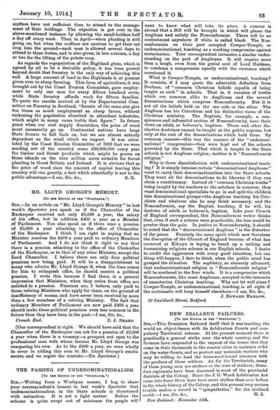MR. LLOYD GEORGE'S MEMORY. ITO en Earecs or nu "sraeravoa."1
Sin—In an article on "Mr. Lloyd George's Memory" in last week's Spectator you speak as if the Chancellor of the Exchequer received not only £5,000 a year, the salary of his office, but in addition £400 a year as a Member Of Parliament. You also speak as if there were a pension of £2,000 a year attaching to the office of Chancellor of the Exchequer. I think I am right in saying that no Minister receives the £400 a year paid to ordinary Members of Parliament. And I do not think it right to say that there is a pension attaching to the office of the Chancellor of the Exchequer, or to that of any other Minister, except the Lord Chancellor. I believe there are only four political pensions now being paid. It will be a disappointment to many who admire Mr. Lloyd George if, when the time comes for him to relinquish office, he should receive a political pension. I write this because I find there is a general impression that Ministers, when they retire from office, are entitled to a pension. Pensions are, I believe, only paid to those retiring Ministers who apply for them, on the ground of insufficiency of means, and have never been received by more than a few members of a retiring Ministry. The fact that ordinary Members of Parliament are now paid £400 a year should make these political pensions even less common in the future than they have been in the past.—I am, Sir, A.4., [Our correspondent is right. We should have said that the Chancellor of the Exchequer can ask for a pension of 22,000 a year when there is a vacancy—a prospect not open to the professional men with whose income Mr. Lloyd George was comparing his own. As to the £400 a year, we were wholly in error in adding this sum to Mr. Lloyd George's emolu- ments, and we regret the mistake.—En. Spectator.]






































 Previous page
Previous page